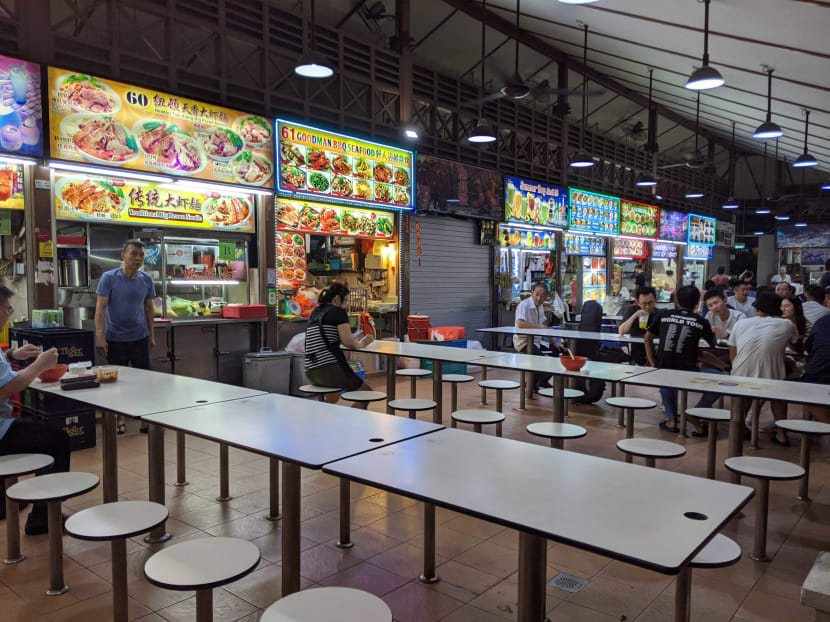‘We’d try to endure’: Hawkers see business plunge by up to 50% due to Covid-19 outbreak
SINGAPORE — They prepare, cook and wait but at the end of the day, they have to throw away more food than usual because people are staying away from hawker centres and crowds during the Covid-19 outbreak.

A view of Newton Hawker Centre on Feb 21, 2020. Some 30 hawkers from 11 food centres across Singapore said that their businesses have been badly affected by the coronavirus outbreak, with takings down a third on average.
SINGAPORE — They prepare, cook and wait but at the end of the day, they have to throw away more food than usual because people are staying away from hawker centres and crowds during the Covid-19 outbreak.
Others grit their teeth and soldier on, because they have survived hardships before and will just roll with this one like before. Some experienced ones cope financially by cutting down on bulk orders of food stock and ingredients to take in just enough until they run out. Some have to forgo their pay.
Many are just simply grateful that, temporarily, the Government has given them a small mercy: A rental waiver for one month so that they do not have to worry about paying rent when earnings have taken a hit.
On Tuesday (Feb 18) when the Budget statement was announced, Finance Minister Heng Swee Keat said that hawker centres managed by the National Environmental Agency (NEA) will have their rental fees waived for a month, with a minimum waiver of S$200.
Madam Samsiah Ahmad, 67, owner of Aunty Sham Ayam Penyet at Berseh Food Centre in Jalan Besar, has been cutting back on her personal expenses to keep her business afloat this period.
"(Getting the waiver) is a huge sigh of relief. We were thinking of how to pay the rent for the month. Now we have reserves for next month's rent and that definitely helps."
Another stall owner Asiah Omar, 66, who sells noodles at Tekka Market, said that any help granted to her was good.
“Business has gone down by 50 per cent. After paying the cleaning costs and other costs, sometimes I go without salary.”
For Mr Jin Thng, 28, who has been running a noodle stall at Amoy Street Food Centre for the past four years, the waiver has helped to ease the potential paycut he had to take.
“Without the rental waiver, there wouldn’t be any value to even operate the stall during this period. But with that, I’m still able to fetch a decent pay while serving customers.”
Mr David Lim, 64, who runs Empress Place Teochew Beef Kway Teow at Maxwell Food Centre, is unsure what will happen beyond the month though. If the outbreak persists, the waiver for just one month may not be enough to help them survive, he said.
TODAY spoke to 29 hawkers from 11 food centres across Singapore and they all said that their businesses have been badly affected by the coronavirus outbreak, with takings down a third on average.
Food centres are no longer as bustling as before even if lunch and dinner time still see higher traffic than other times. In general, fewer customers in total are patronising their stalls.
Stall holders located in central Singapore attributed this decline to the segregation plans implemented by companies where employees are encouraged to work from home.
Those located in the heartlands observed that more customers now prefer to cook at home rather than eat out.
‘WORSE THAN SARS BECAUSE OF TECHNOLOGY’
Mr Tay, 47, who owns a stall at Hong Lim Food Centre, said: “No matter how nice the food is, how famous you are or how many awards you have, the coronavirus prevents people from coming.”
Mr Tay, whose curry noodles are famous, said that business has dropped by 40 per cent since news of the virus outbreak broke late January.
“People stopped wanting to eat at hawker centres. It is the worst place to be, because people are sitting near each other.
“The impact on our hawker business is worse than Sars (severe acute respiratory syndrome). Technology has enabled people to be better informed of the virus situation. With everyone wanting to take necessary precautions to avoid getting infected, nobody is willing to come,” Mr Tay added.
The 70-year-old owner of Hokkien Street Bak Kut Teh at the same food centre, who wanted to be known only as Mr Toh, said that his business has plunged by 40 per cent ever since the authorities raised the Disease Outbreak Response System Condition (Dorscon) to Orange level, which indicates that a virus is spreading here but is being contained.
“Many office people are not coming and people want to avoid running into large crowds,” Mr Toh said.
FEWER FOREIGN WORKERS, SOME STUCK IN CHINA
There has been a reduction in foreign customers as well, the hawkers said. The usual snaking queues formed by foreign workers on Sundays have also disappeared.
Madam Ponamah Shanmugam, 71, owner of Sky Lab Cooked Food at Tekka Market and Food Centre in Little India, said that fewer migrant workers visit the market on Sundays compared with before the outbreak.
“I used to be able to finish 25kg of flour in two days, now I take six to seven days. Even the lunch crowd is small now. If you come at 2pm, you will see that it's empty. No one.”
Mr Muhammad Ayub, 60, who sells North Indian food at the same market, said: “Before the virus came, office workers will come and pack food in the evening. Now, it’s very quiet at that time.”
This decline can also be seen over at Haig Road Market and Food Centre.
The owner of Hai Kee Mixed Vegetables stall, who did not want to be named, said that his business has dropped by 30 per cent due to a reduction in Chinese foreign workers, who used to patronise his stall every morning.
“Before Chinese New Year, dozens of Chinese foreign workers would come in the morning to take away food. In the past few weeks, only two workers came.
“The rest had returned to China for the new year and are unable to return. Housewives now prefer to cook at home more instead of packing food home… we’re fortunate enough to survive on old-time customers who trust us” the 58-year-old said.
WASTED FOOD, OTHER COSTS
Beyond worries about lower earnings and having to maintain rental costs, many hawkers also said that the high running costs of cleaning, utilities and food ingredients weigh heavily on their mind.
Mr Roland Teo, 56, owner of Coffee Hut at Berseh Food Centre in Jalan Besar, said that rent makes up just one portion of what they pay each month.
“There are still conservancy and table-cleaning costs, excluding utilities. So the one-month rental waiver works out to paying just half our costs.”

Mr Tay, who sells curry noodles at Hong Lim Food Centre, said: “It’s not about the rent but the cost of the food. If nobody wants to come out to eat, what’s the point of waiving the rental?
“All the food we cook would be wasted.”
A 58-year-old hawker at the Haig Road food centre who wanted to be identified only as Mr Omar agreed: “We still have a lot of food left at the end of the day.”
‘WE’LL WORK FOR AS LONG AS WE CAN’
For other long-time hawkers, the virus outbreak is merely another storm to weather, and the resilient ones among them are just waiting out until things get back to normal.
One hawker selling soup at Hong Lim Food Centre, and who wanted to be known as just Mr Chen, said that he is not too worried even though his business had dipped since the start of February.
“We just have to go through it until it’s over. We would try to endure for as long as we can.”
Mr Lee Kim Saik, 58, owner of Hong Wan Food Stall that sells rice with dishes at the same food centre, is taking things one step at a time.
Apart from stall rental fees, which is estimated to be about S$1,100 a month, Mr Lee pays another S$1,300 on gas, utilities and miscellaneous fees.
“We will work for as long as we can, but if we can’t continue any longer, we will return the stall to NEA,” Mr Lee said.
‘NOT WORRIED, SINGAPORE IS SAFE’
Mr Derrick Wong, 70, a retired lawyer, told TODAY that he has still been going to hawker centres every day to meet friends.
“I’m not worried. I think Singapore is safe and the Government has given enough information about the matter. They have quarantined the necessary individuals, so now it’s a question of luck. I’m not avoiding crowds. This is not an epidemic and life goes on,” Mr Wong said.
However, unlike Mr Wong, half of the 10 patrons interviewed by TODAY said that they have avoided eating at hawker centres lately.
Freelance photographer Lee Yuen, who had a surgical mask on hand and eating at a hawker centre in Bukit Merah, said: “Today is the rare occasion that I am eating here. Since the start of the outbreak, I have been buying food and taking it home usually... especially for lunch and dinner.”











